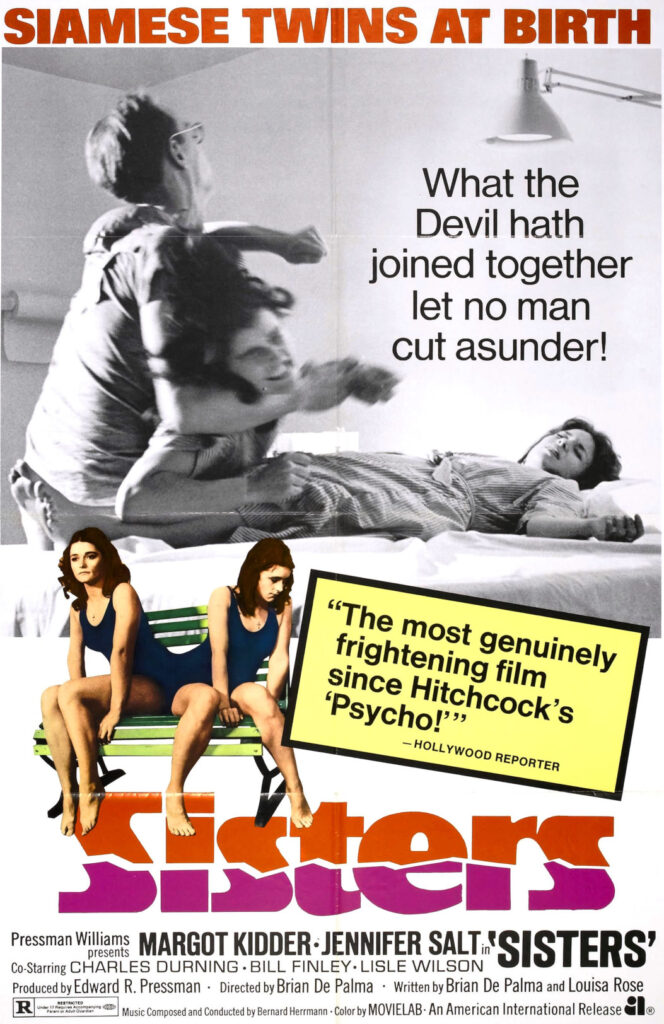
SISTERS (aka BLOOD SISTERS) (director/writer: Brian De Palma; screenwriters: Louisa Rose/based on a story by Mr. De Palma; cinematographer: Gregory Sandor; editor: Paul Hirsch; music: Bernard Herrmann; cast: Margot Kidder (Danielle Breton/Dominique Blanchion), Jennifer Salt (Grace Collier), Mary Davenport (Mrs. Collier), Charles Durning (Joseph Larch), William Finley (Emil Breton), Lisle Wilson (Phillip Woode), Barnard Hughes (Arthur McLennen), Dolph Sweet (Detective Kelly), Olympia Dukakis (Louise Wilanski, bakery lady), Justine Johnson (Elaine, bakery lady); Runtime: 92; MPAA Rating: R; producer: Edward Pressman; Criterion; 1973)
“It’s one of the best films of the 1970s.”
Reviewed by Dennis Schwartz
The first pic of Brian De Palma(“Carlito’s Way”/”Obsession”/”Dressed to Kill”), the son of a doctor, to make critics take notice, and his first venture into Hitchcock turf (think Rear Window and Psycho). The chilling horror pic is co-written by De Palma and Louisa Rose, and is based on a Life Magazine story by De Palma. It’s one of the best films of the 1970s. Intelligently and stylishly made (innovatively explores using split-screens). It’s also pre-occupied with the director’s usual themes of voyeurism and using doubles, and is eerily maddening. The graphically violent shocker drips with sarcastic humor and is bloody good as an entertaining slasher pic. It ably set the tone for De Palma’s future films.
The pic opens with a ‘Peeping Toms’ television game show, something like Candid Camera via Michael Powell, where black contestant Phillip Woode (Lisle Wilson) peers over a wall into a women’s dressing room while the blind girl Danielle Breton (Margot Kidder) undresses and two panelists guess if he will continue looking or walk away. Danielle tells the host she’s a divorced French-Canadian, who is not blind but aspires to be a model/actress. For their efforts, the contestants win the following gifts: Danielle a cutlery set and Phillip a free dinner for two at The African Room, where Danielle gets him to take her to dinner. When her creepy divorced hubby, Emil Breton (William Finley), who follows her, comes to take her home at the club and she refuses, Phillip has the bouncers kick him out and as a reward she invites him to her Staten Island hi-rise building apartment for a bedtime romp. In the morning, after revealing her separation scar, Danielle tells Phillip that her Siamese twin sister Dominique is in a mental hospital because of her psychotic condition and they have been separated a year, but the twin has been given permission today to visit to celebrate their birthday. Phillip, always the gentleman, buys a birthday cake at the nearby bakery, and asks Danielle to blow out the candles and make a wish. That summons up Dominique’s maniacal killing instincts and she merges into her twin’s head to brutally slash him a number of times with her gift of the large carving knife. This is witnessed by Danielle’s nosy across the way neighbor, Grace Collier (Jennifer Salt), an ambitious single female reporter for the small-time civic-minded Staten Island newspaper, who spots the vic at the window crying for help and calls the police. But they’re unfriendly because of her articles on police brutality, and are in no rush to check-out the apartment. When they reluctantly search the apartment they don’t find the body or any evidence of a murder, as moments before the corpse was stuffed inside a Murphy-bed and the blood stains all over the apartment were cleaned-up by Emil. Not satisfied that Danielle is innocent and wanting to get a career boost with a big crime story, Grace convinces her editor to let her further investigate and is teamed with the by-the-book private detective Joe Larch (Charles Durning).
It ends on a spooky humorous note, as Emil somehow (no need to use spoilers to show how he achieved this feat) manages to inject the truth-telling journalist, Grace, with a sedative, and brainwashes her to now believe no murder took place and the feminist reporter, fighting for independence in a man’s world, is left in a zombie-like state to be under her nagging mom’s (Mary Davenport) care, while the PI follows the couch to a dead-end destination in rural Canada and in one of cinema’s greatest fadeout shots he’s dressed as a telephone lineman and hanging from a telephone pole waiting for an expected call that will never come. It ironically concludes with the murderess getting away with murdering Phillip, but charged with murdering her love-stricken manipulative husband shrink.
Hitchcock’s music man Bernard Herrmann provides a score that would make the Master proud, while De Palma should be lauded for his masterful mise-en-scene and inspired homage to Hitchcock.
REVIEWED ON 1/15/2014 GRADE: A
© ALL RIGHTS RESERVED DENNIS SCHWARTZ